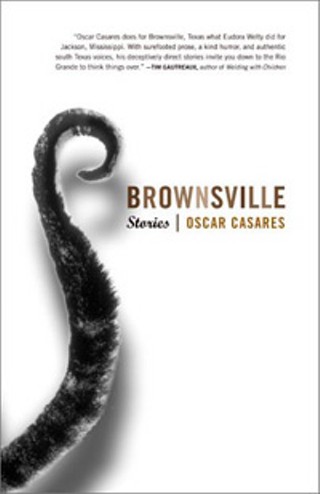Book Review
"Casares has been listening," Roger Gathman writes of the Brownsville native's Brownsville: Stories. "His dialogues seem to hang just outside the realm of literature, which is where real writing happens." The recent Dobie-Paisano fellow will kick off his book tour at BookPeople on Thursday, March 6, at 7pm.
By Roger Gathman, Fri., Feb. 28, 2003

Brownsville: Stories
by Oscar CasaresLittle Brown, 208 pp., $13.95 (paper)
Scientists have recently discovered that if you tickle a young rat, you can get him to giggle -- or the rat equivalent, which is a high chirping noise. So much for the theory that man is the only animal that laughs. However, there's no word from the laboratories yet on the rat wisecrack. In that field, at least, we can still pride ourselves on being the summit of creation.
Wisecracks are very much part of the world of the characters in Oscar Casares' collection of short stories, Brownsville. Here, for instance, is the dialogue that ensues when Marcelo Torres tells his neighbor to stifle his noisy dog:
"'He's just getting used to the neighborhood, Torres. I think he likes it here. It makes him happy, de la gusto, and he barks.'

"'I don't care why the hell he's barking, Sanchez. He could have won the lottery and I wouldn't care.'"
Or here is Bony's father, Timo Hinojosa, a police sergeant in "Chango." Bony is an unemployed 31-year-old living at home, drinking, and developing a strange affection for the severed head of a monkey that he found tossed into the front yard. Timo is trying to encourage his boy by telling him that the Colonel tried 124 recipes before he got the original crispy just right. Bony responds, "what was he the Colonel of?"
"¿Pues quien sabe? He was just a colonel, of the Army, of the Marines, of all the chickens and roosters. It doesn't matter, Bony."
Sergeant Hinojosa and Marcelo Torres could be tickled by scientists in a lab from now until doomsday, and they wouldn't chirp; but the poetry of their slow burns tells us that Casares has been listening. His dialogues seem to hang just outside the realm of literature, which is where real writing happens. Casares recognizes that, at the core, the wisecrack expresses a deep, metaphysical melancholy: It's a pained, Augustinian response to the delusion that happiness can be pursued. A wisecrack is funny in exact proportion to the unfunniness of the world around the man making it. Casares' readers will be tempted to draw a parallel with Flannery O'Connor, whose stories are also populated by wisecrackers and their foils, the obsessives who are fascinated with the symbols that arise, like parodies of redemption, from the hopeless junk in their lives.
For the most part, Casares is writing about blue-collar guys -- Hispanic guys -- dealing with neighborhoods that are going to hell, wives who inexplicably want to get educated, and the general need to defend oneself against wily Anglo strategies. "Yolanda," a story that concerns a man remembering the time when he was 15 and the neighbor's beautiful wife took refuge from his jealousy in his bedroom, begins with a long passage that goes like this: "I'm talking about more than 20 years ago now. I'm talking about before some drunk spent all afternoon in one of the cantinas on 14th Street, then drove his car straight into the Rivas' front yard and ran over the baby Jesus that was still lying in the manger ... This was before Pete Zuniga was riding his brand new ten-speed from Western Auto and, next to the Friendship Garden, saw a white dude who'd been knifed a couple of dozen times and was floating in the green water of the resaca." Etc. The world goes to hell in a handbasket, paradise is lost: Now the story can begin.
Since Chekhov invented understatement, the great modern short stories have compulsively shown what doesn't happen, the adventure that's aborted. In "Yolanda," the narrator never has sex specifically with his beautiful neighbor. In "Chango," Bony does obey his dad and throw away the monkey head, and in "Charro," Marcelo does give up trying to kill the neighbor's dog. But don't mistake Brownsville for something like Anderson's Winesburg, Ohio. Casares is no facile distributor of small-town epiphanies. As Bony thinks, dropping Chango's head in a canal, "sometimes he listened, but most times he didn't. He was just living. That's the best explanation he could give. Living."








